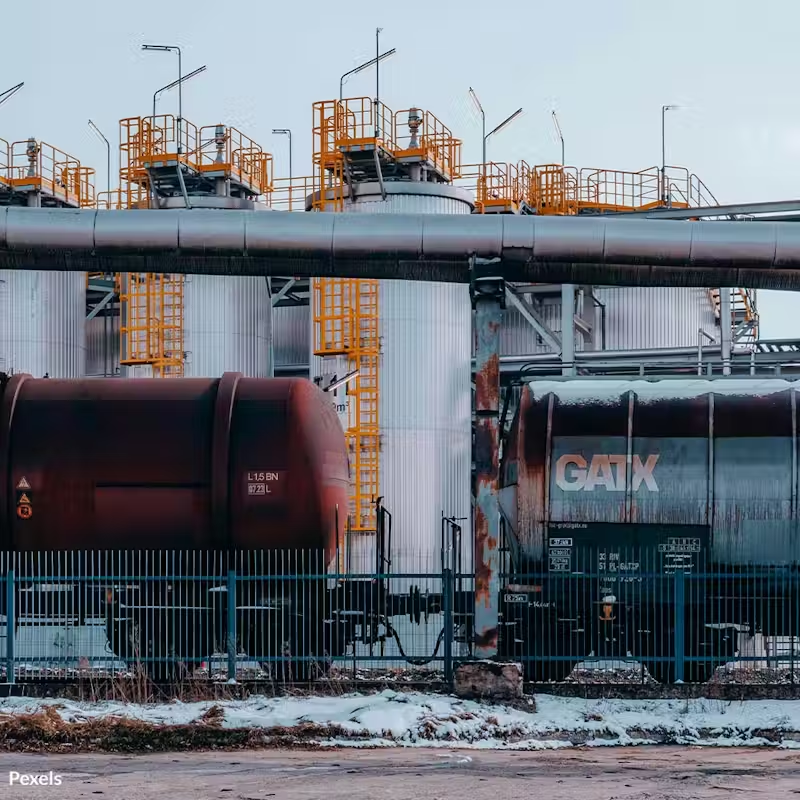Stop LNG From Polluting Air, Poisoning Water and Destroying Our Climate
4,587 signatures toward our 30,000 Goal
Sponsor: The Rainforest Site
LNG pollutes our air, poisons water, and drives climate change—let’s stop fossil fuel greed from endangering our communities and demanding a cleaner, safer, and more sustainable energy future.

Liquified Natural Gas (LNG) is marketed as a cleaner fuel, but this claim hides the risks that its extraction, transport, and export pose to the health, safety, and environment of American communities. As LNG export terminals and transport routes multiply across the U.S., the dangers intensify. Methane, the primary component of LNG, is a potent greenhouse gas that accelerates climate change. Leaks and spills along the LNG journey—from drilling to export—release methane and toxic pollutants that harm air quality, contaminate water, and threaten ecosystems1.
Explosive Hazards and Health Risks
LNG facilities carry unique risks of fires and explosions. In Texas, an explosion at an LNG plant caused a fire that lasted over 40 minutes, revealing the dangers communities face when LNG is stored under high pressure2. If LNG leaks, it forms a vapor cloud that can ignite in an instant, causing massive explosions and deadly shockwaves. For nearby communities, this means living under constant threat, especially as most LNG facilities are situated near neighborhoods already struggling with industrial pollution3.
In Port Arthur, Texas, residents near LNG terminals face a higher risk of cancer, heart disease, and respiratory illness due to pollution from methane and other toxins. These facilities are often located in low-income areas, exposing vulnerable populations to dangerous pollutants while enriching fossil fuel companies4.
A Burden on Households and the Environment
LNG exports drive up domestic energy prices, forcing American families to pay more for heating and electricity. With the U.S. exporting more LNG than any other country, the focus has shifted from meeting local demand to satisfying international markets. This price pressure makes it harder for families to make ends meet, while the oil and gas industry reaps record profits5.
The environmental impact is equally alarming. Methane is 80 times more effective than carbon dioxide at trapping heat over the first 20 years after release. Despite claims of safety, LNG facilities frequently leak methane into the atmosphere, worsening the climate crisis and causing irreparable harm to local air quality6.
The Need for Urgent Action
The last significant federal regulation update on LNG safety occurred in 1980. Since then, the scale and complexity of LNG infrastructure have grown dramatically. Today, LNG is transported in massive tankers and stored in sprawling terminals. Outdated regulations fail to account for the increased risks, putting communities and the environment at greater risk. Experts and advocacy groups agree that stricter standards are necessary to protect public health and the climate7.
Call to Action
It’s time to prioritize people over profits. We call on Congress to pause new LNG export permits, enforce stronger safety regulations, and transition to renewable energy sources that do not endanger American communities. Our health, safety, and future should not be sacrificed for short-term gain.
Join us in demanding action. Sign the petition today and help protect our communities from the dangerous expansion of LNG.
- Brian Palmer, NRDC (9 February 2024), "Liquefied Natural Gas 101."
- Mike Soraghan, Mike Lee, E&E News (28 June 2022), "LNG explosion shines light on 42-year-old gas rules."
- Global Witness (11 October 2021), "Fossil gas, liquefied: What LNG is and why it is a looming climate disaster."
- Tom Pelton, Environmental Integrity Project (5 October 2020), "Ten LNG Projects Delayed."
- Jeff Turrentine, NRDC (8 December 2021), "Who's to Blame for Higher Heating Costs this Winter."
- Tommy Stokmo Jørstad, Gexcon (16 March 2021), "The 7 essential hazards in LNG facilities."
- Edward Dodge, Breaking Energy (22 December 2014), "How Dangerous is LNG?."
The Petition:
To the Senate Committee on Energy and Natural Resources, House Committee on Energy and Commerce, Senate Environment and Public Works Committee, and the Administrator of the Environmental Protection Agency,
We, the undersigned, urge Congress to immediately pause new export permits for liquefied “natural” gas (LNG) and lead the United States toward clean, renewable energy. LNG is a dangerous and dirty fuel. Its extraction, transport, and export pollute our air, poison our water, and threaten the health and safety of our communities.
Liquefying natural gas requires chilling it to -259°F, a process that consumes large amounts of energy and releases harmful emissions. Methane leaks—a byproduct of the LNG process—are a powerful greenhouse gas, trapping heat 80 times more effectively than carbon dioxide over the first 20 years after release. Leaks of this potent gas, as well as intentional venting and flaring, worsen the climate crisis we urgently need to address.
The communities surrounding LNG export terminals and transport routes bear the greatest risks. These facilities are disproportionately located near low-income neighborhoods and communities of color, subjecting them to toxic emissions and increased threats of fires and explosions. In Port Arthur, Texas, residents near LNG terminals face higher rates of cancer, respiratory disease, and other health conditions linked to fossil fuel pollution. Yet, fossil fuel companies continue to profit, often with little regard for the well-being of these communities.
Beyond health and environmental risks, LNG exports drive up energy costs at home. By prioritizing foreign markets, companies are raising domestic prices, forcing Americans to compete with international buyers for U.S.-produced gas. This prioritization leaves American families with higher energy bills, while fossil fuel executives see record profits.
Instead of investing in outdated and hazardous fossil fuels, Congress must focus on expanding clean, renewable energy sources. This transition will not only reduce pollution but also foster innovation and create jobs, laying the groundwork for a resilient and equitable energy future.
We call on Congress to pause LNG export permits, protect public health, and commit to a sustainable, cleaner energy future. Taking action now will safeguard our environment, support communities, and ensure a better quality of life for generations to come.
Sincerely,